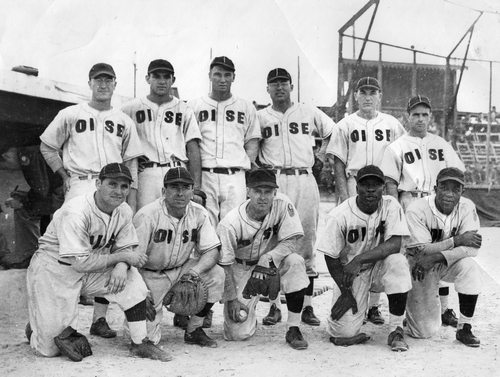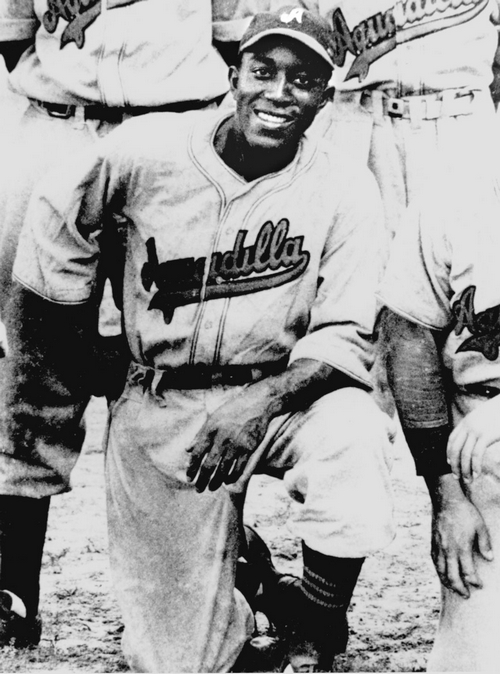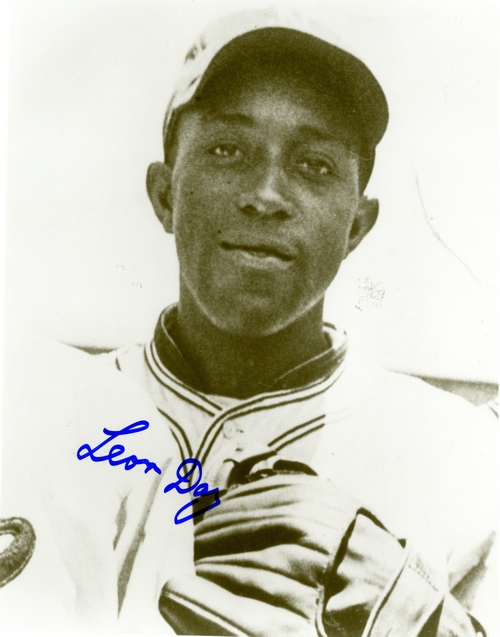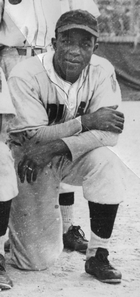Leon Day
Hall of Famers at War
| Date and Place of Birth: | October 30, 1916 Alexandria, VA |
| Date and Place of Death: | March 14, 1995 Baltimore, MD |
| Baseball Experience: | Hall of Fame |
| Position: | Pitcher |
| Rank: | Unknown |
| Military Unit: | 818th Amphibian Battalion US Army |
| Area Served: | European Theater of Operations |
Leon Day was born on October 30, 1916, in Alexandria, Virginia. The
Day family moved to Baltimore in 1917, when he was 6 months old. His
father worked in the segregated community of Westport and the family
lived on Pierpont Street in Mount Winanas in a house that had no
electricity or running water.
After two years at Frederick Douglass High School, Day left to play
semi-pro baseball with the Silver Moons. At 17, he joined the Baltimore
Black Sox, but financial troubles soon caused the team to disband and he
joined the Brooklyn Eagles. In his first season with the Eagles, Day was
9-2 and hurled a one-hitter. The Eagles relocated to Newark in 1936, and
the following season he compiled a perfect 13-0 record while batting
.320. Day had established himself as a star of the Negro Leagues as well
as turning in outstanding performances in Mexico and Puerto Rico.
The 1942 East-West all-star game played in Chicago was a classic
showdown between Satchel Paige and Leon Day. Both pitchers entered the
game in the seventh inning with the score tied at 3-3. Day struck out
five of the first seven batters he faced and held the West team
scoreless while Paige allowed three runs to take the loss. In 1943, Day
was 4-5 and batted .304 for the second from last-placed Eagles. It was
his last season in professional baseball for three years. The Army
drafted 26-year-old Day on September 1, 1943. He served with the
all-black 818th
Amphibian Battalion in Europe and was at Utah Beach six days after
D-Day, bringing ammunition ashore in a DUKW (known as a Duck), a
six-wheel-drive amphibious vehicle.
When the war in Europe ended, Day was in France along with fellow Negro
Leaguers Johnny Hayes, Max Manning, Charlie Parks and Willard Brown. Day
and Brown were both selected to play with the integrated Oise All-Stars
baseball team run by Phillies’ pitcher Sam Nahem and representing the US
Army's Oise Section of northern France. The All-Stars – on
paper a mismatch of minor league, Negro league and semi-pro players –
breezed through the opposition and reached the ETO World Series
championship finals where they faced the formidable 71st Infantry
Division representing the Third Army. The 71st Infantry line-up featured
Ewell Blackwell, Harry Walker, Johnny Wyrostek and Maurice Van Robays.
Before a crowd of 50,000 at Nuremberg Stadium in Germany, undoubtedly
the biggest crowd to see a baseball game in Europe during WWII, Ewell
Blackwell of the 71st easily defeated Bob Keane of the Oise All-Stars,
9-2. But Game Two, with Leon Day on the mound was a different story. Day
allowed just four hits and struck out ten to lead the All-Stars to a 2-1
victory and even the series at one game apiece. The All-Stars clinched
Game Three by a score of 2 to 1 with Sam Nahem on the mound and Day came
back to pitch Game Four. This time, however, he was not as successful,
beaten by the 71st, 5-0.
Nevertheless, the All-Stars clinched the series in the final game on
September 8. Sam Nahem and Bob Keane combined for the 2-1 win. The Oise
All-Stars, together with some of the players from the Third Army team,
traveled to Italy the next month to play for the Mediterranean Theater
championship, against the all-black 92nd Infantry Division team.
Day was discharged in February 1946 and returned in style to the Newark
Eagles in May. He hurled an opening day 2-0 no-hitter against the
Philadelphia Stars. Day faced only 29 hitters and struck out six. “Day
dazzled the Stars with his speedball,” wrote the Baltimore Afro-American
on May 11, 1946, “allowing only three to reach first base, one on a walk
and two on errors by teammates.”
He finished the season with a 14-4 record, and led the league in
strikeouts, innings pitched, and shutouts, as the Eagles cruised to the
Negro National League title. Unfortunately, Day came up with a sore arm
towards the end of the season. With the Polo Grounds full of major
league scouts, the 30-year-old was ineffective in his only World Series
appearance against the Kansas City Monarchs.
In 1947, the year Jackie Robinson broke the color line in Major League
baseball, Day played for the Mexico City Red Devils of the Mexican
League. He was 10-11 on the mound and batted .359. He was back with the
Red Devils in 1948 and posted an 8-9 record and 4.34 ERA. He continued
to play in the Mexican League in 1948 but returned to the Negro National
League in 1949 to help the Baltimore Elite Giants win the pennant.
Day went to Canada to play for the semi-pro Winnipeg Buffaloes of the
Man-Dak League in 1950. Then, in 1951, aged 34 and well past his prime,
he entered organized baseball, pitching for Toronto of the International
League. He also pitched for Scranton of the Eastern League in 1952 and
compiled a 13-9 record and 3.41 ERA. Day returned to Canada in 1953 to
play for the Brandon Greys in the Man-Dak League. He ended his career
with the Greys in 1955.
"People don't know what a great pitcher Leon Day was,” said Monte Irvin.
“He was as good or better than Bob Gibson. He was a better fielder, a
better hitter, could run like a deer. When he pitched against Satchel,
Satchel didn't have an edge. You thought Don Newcombe could pitch. You
should have seen Day! One of the best complete athletes I've ever seen."
On March 7, 1995, the Veteran's Committee elected Leon Day to the
Baseball Hall of Fame. He was the 12th Negro League star elected. Leon
Day had been admitted to St. Agnes Hospital in Baltimore with a heart
condition a few days earlier and died on March 14, aged 78.
“It is rare that you find an individual with talent, ambition and
humility,” declared the Honorable Kweisi Mfume in the House of
Representatives on March 15, 1995. “But those are just some of the
defining and wonderful qualities of Leon Day, one of Baltimore's true
heroes.”
In 2001, Day’s widow, Geraldine Day, founded the Leon Day Foundation in
Baltimore, Maryland, to assist at-risk youth by providing opportunities
for them to participate in organized sports.

OISE All-Stars in France, 1945. Leon Day is front row, far right


Date Added July 27, 2016
Can you add more information to this biography and help make it the best online resource for this player? Contact us by email
Read Baseball's Greatest Sacrifice Through The Years - an online year-by-year account of military related deaths of ballplayers
Baseball's Greatest Sacrifice is associated with Baseball Almanac
Baseball's Greatest Sacrifice is proud to be sponsored by

